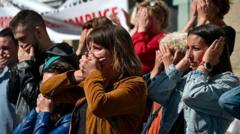As the landmark trial of paedophile surgeon Joel Le Scouarnec draws to a close, victims express frustration over France's indifference, demanding greater recognition and action from authorities. Activism seeks to challenge the systemic silence surrounding child abuse.
Collective Outcry: Le Scouarnec Trial Highlights France's Struggle with Child Abuse Awareness

Collective Outcry: Le Scouarnec Trial Highlights France's Struggle with Child Abuse Awareness
The trial of former surgeon Joel Le Scouarnec, accused of sexually abusing nearly 300 children, reveals a concerning apathy from the public and French authorities regarding child abuse cases.
In the coastal town of Vannes, Brittany, France, the highly anticipated trial of retired surgeon Joel Le Scouarnec, who confessed to sexually abusing 299 children, has underscored a troubling societal indifference to child abuse. Scheduled to conclude this Wednesday, the trial has fallen short of the broader engagement expected from the public and government institutions, frustrating victims who expected this case to catalyze national discourse.
"I feel exhausted and angry," stated victim Manon Lemoine. "Our society seems indifferent, which is terrifying." Alongside roughly 50 other victims, Lemoine founded a campaign to urge authorities to take notice of what they deem a "landmark" trial mired in institutional neglect. They are questioning why significant public inquiries have not been initiated, contrasting their situation with other high-profile abuse cases.
Despite the sheer magnitude of the alleged crimes committed between 1998 and 2014, the trial has not garnered the public attention seen in similar cases, such as the Pelicot mass rape trial. This lack of engagement raises questions about societal unwillingness to confront the abhorrent reality of child sexual abuse. "Perhaps the number of victims is overwhelming, leading to a chilling silence," said Maëlle Nori from the feminist group Nous Toutes.
The trial has revealed the grotesque details of Le Scouarnec's predatory behavior, including his systematic abuse of children under the guise of medical treatment. Yet, many in France seem reluctant to confront the deep-seated cultural and institutional failings that allowed his actions to persist unhindered for years.
Lawyers representing victims have criticized the societal "code of silence" around child abuse, pointing to a prevailing reluctance to discuss such issues openly. Some experts believe this aversion is particularly acute in France, where societal structures often protect abusers, especially those in esteemed positions.
The emotional ramifications of the trial extend beyond the courtroom. Many victims have found strength in their shared experiences, forming a bond that helps them confront their past traumas. "This trial is like a restorative process,” noted lawyer Myriam Guedj-Benayoun. "It reveals the reality of trauma and the necessity for societal change."
As public scrutiny remains limited, victims chose to leverage their visibility a step further, shedding anonymity and advocating for recognition. They hope that their actions will compel society to acknowledge the severity of the abuse and prevent future occurrences.
While Le Scouarnec is expected to receive a guilty verdict, activists remain hopeful that this trial can spark a critical dialogue about child rights and protective measures in France. The road to change may be challenging, but voices for reform are emerging, determined to prevent the Le Scouarnec case from fading into collective silence. As tensions mount, many ponder whether this trial will mark a significant turning point in the fight against child sexual abuse in France.




















